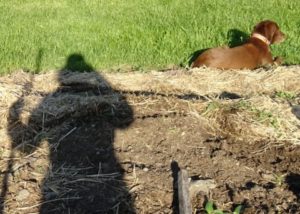 It’s a stretch to call us friends. Meniere is an alien living in me, a shadow, a twin joined at the inner ear.
It’s a stretch to call us friends. Meniere is an alien living in me, a shadow, a twin joined at the inner ear.
She showed up in the 1990s with a pop in my right ear and a subtle muting of sound. A response to altitude? A wax build up? A bad attitude? No one knew.
There were years when she didn’t demand much other than one hearing aid in the weaker ear. She hid in the background like a stealthy sniper.
“There’s no reason to think you’ll lose more hearing,” my trusted otolaryngologist at Strong Audiology in Rochester, NY said after thorough testing around 1995. “Your loss is mild. It shouldn’t get worse.”
Meniere wasn’t listening. Instead, she grew stronger and I grew deafer in fits and starts. We held steady between 2006 when my husband was diagnosed with cancer and 2013, five years after his death. Under the worst pressure of my life, she was merciful—or on vacation.
Until she wasn’t.
In February 2013, I had what’s aptly called a “drop attack.” Without warning, I fell over walking with my friend Janet in downtown Ithaca. When I tried to stand or even sit, I toppled over. My mind was clear, but I had no balance. When the disequilibrium was at its worst, nausea and vomiting joined the party. The world and I were out of control, just when I had a book coming out.
Is that any way to treat a friend?
It’s hard to diagnose this disease, but my neurologist, ENT, audiologist, and internist finally agreed. My companion got a formal name: Meniere’s Disease. She’s a bitch to treat.
I tried acupuncture, homeopathy, salt-free and sugar-free diets, cranio-sacral therapy, flower essences, massage, chiropractic, energy healers, and physical therapy. I tried a medical psychic before I surrendered to a low dose mix of prescription drugs that keep me upright. I dug into psychological connections. I’d been depressed and jealous of my husband’s writing success when deafness began, but that had ended long ago. I worked hard with therapists to find the psychological thread, but nothing held. Meniere had a mind of her own.
Before she showed up, I loved socializing and playing. I loved to jive and tease with quick verbal pokes and laughs. I loved dancing to wild rhythms and listening to opera and classical music. I loved restaurants, classes, lectures, and traveling.
Meniere hates all that.
She wants me to herself. She doesn’t even like my family. She likes silence or the simplest sounds like peeper frogs or a mourning dove. She likes my quiet dog. Music is dissonant noise to her. She’s agitated by restaurants and parties. If given a choice, she’ll stay home.
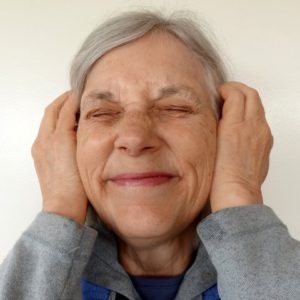 Extroverted and curious by nature, I struggle with a disease that cuts off communication. I won’t give up. Despite it all, I’ll lead a weekend workshop about “Aging, Grief, and Mythology” at the C.G. Jung Association of Central Ohio this fall. I warned them that my friend Meniere will be with me. It’s easy to present material, but the problem is with discussion. I’ll need help. They want to help. I’m willing to try. I’ll keep trying until I fall flat on my face
Extroverted and curious by nature, I struggle with a disease that cuts off communication. I won’t give up. Despite it all, I’ll lead a weekend workshop about “Aging, Grief, and Mythology” at the C.G. Jung Association of Central Ohio this fall. I warned them that my friend Meniere will be with me. It’s easy to present material, but the problem is with discussion. I’ll need help. They want to help. I’m willing to try. I’ll keep trying until I fall flat on my face
I want to teach and attend conferences, but Meniere shakes her head and scowls. I stand with my hands on my hips and growl at her. I’ll keep doing what I love as long as I can.
When I try to hear in a noisy world, she howls and echoes like a horror movie. She drones and hums like a room of industrial fans. It’s too loud or too soft or too distorted or muffled or mushed. When I ignore her, she sends imbalance, disorientation, and exhaustion. Sleep, rest, and time-outs from hearing help. When that fails, my doctors and I worked out effective medicines. Some I use daily. Others I use when Meniere acts like wild child on a rampage.
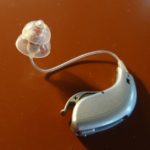 Menier recently killed the remnants of hearing in my left ear. I’m ready to try a new right ear hearing aid, though my doctors don’t think it will help much. Since my hearing aids are five years old, it’s worth a try. A cochlear implant may be in my future, but my right ear is holding on. Besides, I’m great at reading lips.
Menier recently killed the remnants of hearing in my left ear. I’m ready to try a new right ear hearing aid, though my doctors don’t think it will help much. Since my hearing aids are five years old, it’s worth a try. A cochlear implant may be in my future, but my right ear is holding on. Besides, I’m great at reading lips.
“You’re stubborn,” a friend said when I told her I’d agreed to give a workshop. It’s true. I’m stubborn.
Meniere is a bully. She wants an exclusive relationship. I’m not willing. I try to see her as a teacher about suffering and how little we can control. I’m grateful I’m a writer, not a singer. I’m grateful she hasn’t stolen writing. I’m glad she doesn’t interfere with my love affair with Nature. I’m grateful for patient friends and family.
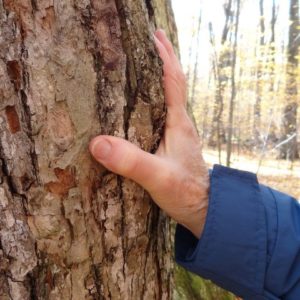 Stuck with an unwanted intruder, I try to figure out how to befriend her or at least have compassion for my situation. Self-loathing doesn’t get me anywhere.
Stuck with an unwanted intruder, I try to figure out how to befriend her or at least have compassion for my situation. Self-loathing doesn’t get me anywhere.
***
Do you struggle with infirmities that make it harder to do what you love? How do you handle this? Are you ready to give up? Hearing loss is associated with social isolation, dementia, and depression. Yikes! That inspires me to stay connected through social media, small social gatherings and classes, and through writing. For another article about my hearing adventures, see Dizzy, Deaf, and Determined. I’m inspired by Evelyn Glennie, a world-class drummer who hasn’t let deafness stop her. Her TED talk is “How to Truly Listen.”
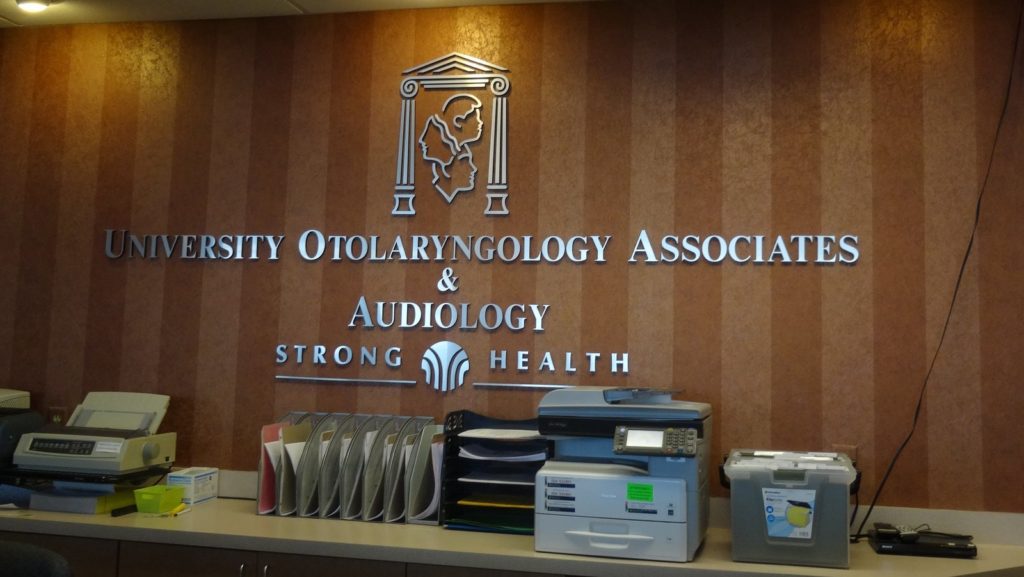
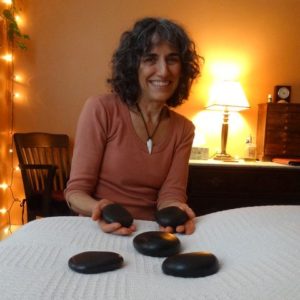

Dear Elaine, Thank you so much for sharing your challenging and inspiring stories with that bitch, hereafter known as M, for I know so little about her! As a psychotherapist my job I feel is to listen deeply to others and although (like Evelyn) I listen with my heart, hands and my whole body, I sense that without “functioning ears” I wouldn’t be able to pursue my work in my beloved vocational field. Hmm, then what would I do I wonder? I laugh as I hear my creative spirit, my animus swiftly reply, “Finally, you could write, and do so full-time!”
Hmm, so I guess like many, I take my hearing for granted. I guess we all do until something like M turns up and takes it away from us. It’s interesting that M first came a-knocking at a time when you felt frustrated, depressed and envious of Vic’s writing success. For myself, whenever I experience illness (however defined) at some point (usually in the middle of it!) I turn to Louise Hay for deeper answers, and on the subject of deafness she writes, rejection, stubbornness and isolation are its causes, topics you’ve touched on here in your rich article.
Although I wonder if Louise’s affirmations resonate as presently you’re achieving great writing success! Your connection to words and images is profound. You allow your soul’s missives to come through. No, there’s more to M than she’s letting on. By using a Jungian lens we see that what doesn’t work above (consciously) can often be busy working below (unconsciously) … for you naturally possess the eyes and ears of psyche, such is the depth of your inner hearing and the healing messages you bring back. Warm and wild blessings, Deborah.
So the good thing is I get to write full time, give a few talks, garden, and watch bluebirds and butterflies. I took my hearing for granted, too. I didn’t know anyone well who had hearing problems, so didn’t understand how isolating it could be. I had never heard of Meniere’s Disease, so I had lots to learn. I have explored Louise Hay and others. I think much of the issue was learning to listen to myself. And then there is the randomness of Miss M and how dissociation (I don’t have spinning vertigo) strikes whenever she pleases. Any website about Meniere’s focuses on the frustration of this randomness and inability to find the triggers.
I’ve learned to hear words in a new way and watch the world with more focus and clarity. I’ve learned to read lips and faces. I’m spending this week with a visiting friend and love our conversations in the quiet spaces of nature and my home. I’m grateful I can still meet people in person with words as well as in writing. Another friend (Jungian astrologer) suggested we might pay a price for spending many years sitting on those meditation cushions listening and focusing within. That’s an interesting perspective, too. Although I’d rather this Miss M would take a hike, I’m good at finding a way through this–so far. I’m supported by loving people who are willing to meet me in quiet places and let me read their lips. Thank you for being one who sits close and hears me, even if you’re across the ocean and we’ve never been in the same physical room.
Oh my dear Elaine! How I can relate. Although I don’t have a friend just like yours, I am hearing-impaired and require hearing aids in both ears. I’ve never read a more accurate description of the unwelcome effects and consequences of hearing loss! Thank you for this. You are a brave and determined lady, and a terrific role model for the rest of us.♥
Thanks for responding with your usual kindness, Marty. I am determined, but I know so many of us have issues we have to struggle against each day. It seems to be part of the baffling and complicated human condition. Thank you for continuing to respond to those who grieve from your deepest heart.
It was light-hearted, even fun to “listen” to, though I feel maybe I’ve been with a more despairing side on occasion. Or maybe that was just my own sorrowful subjectivity. Have you thought about hand reading? This brief 3 minute film should interest you. It is Helen Keller speaking with a dear friend about her biggest disappointment. Follow the link. https://www.youtube.com/watch?v=8ch_H8pt9M8. Hit the ‘cc’ button (closed caption) on the bottom right. It won’t help when Helen speaks but if you have any difficulty hearing it will adequately translate her friends translations of Helen’s talk.
Yes, you’ve seen the despairing side and that’s there, too. Over and over, the despair is faced and soothed, but not allowed to sail my ship. I’m the captain, not Meniere’s. ASL is a wonderful skill, but do you know it? I didn’t think so. No one I know well signs with ASL. I could learn at a kindergarten level, but it’s like learning Chinese and it would take many years to develop skills to have deep conversations with ASL. I’ve talked to my doctors about this repeatedly, problem solver that I am, and they suggest that I am part of the hearing world even though I struggle with it, so lip reading is best and a cochlear implant will help when I qualify which may be soon. Thanks for the Helen Keller clip. I’ll look at it. My mother loved Helen Keller when I was a child, so I did, too.
Elaine, I feel exactly the same way about ASL. No one I interact with, to the best of my knowledge, knows it. Learning it at my age would be rather futile, as it wouldn’t help me communicate anyway with friends and family. I do some lip reading to augment my hearing aids. Thank you for this useful post.
I’m glad it was helpful, Jean. My doctors advised I focus on lip reading rather than ASL because trying to communicate in a new language as a beginner with no close friends who know ASL would be another kind of isolation. I do decently when acoustics are good, and friends and family try to help by looking at me when they speak and enunciating. They also send emails and texts instead of calling on the phone. I tell them that if I seem completely confused, I probably misunderstood or got tired of saying “What?” It’s not an easy process, but for me it’s worth the effort. Best to you as you navigate hearing.
Such a beautiful name for a bully. I am stubborn too. Blessings to you. Go forth, and teach Meniere some manners!
I’m laughing, Lori. I keep Meniere in her place. I listen to her struggles. I feel how hard it is to live in a body that used to be so grounded and still is most of the time, but sometimes isn’t. I’m understanding and patient and honest about this (which is why I wrote the blog), but in the end I make the decisions. Meniere has to sit in the bully chair and wait.
Elaine, you inspire me with your courage, energy and determination. Lately I’ve been dealing with a disability called “blepharitis” that affects my eyes. Since I’m a visual artist, and the paint I use is probably an irritant, I might have stopped painting. But I open a window in my studio and keep at it.
I have tried every remedy I can find also, including my doctor’s and the alternative ones I found online. Some offer a little temporary relief.
My eyes are tired all the time and prefer to be closed. I can no longer meditate with them open, so I meditate with them closed, trying not to fall asleep!
I will follow your inspiration and keep going. Thanks for your post.
Oh no, Lynne. This sounds so difficult. Another disability I haven’t heard of, but I just read a little and it sounds maddening. Does it make vision blurry? I don’t know what we can do except keep going and learn to do things in a new way. In workshops, I was always involved with every detail including small group sharing, but this time I’ll ask others to facilitate small groups. I’ll set up the guidelines and questions, but won’t try to hear (or pretend I hear) what people say when there are many small groups in the room and many voices. Better to face my limitations and find a way around them. It forces me to be creative and do things in new ways.
I can’t imagine you surviving without creating with color and light. Do you use other materials or mediums? That’s too obvious and possibly irritating to mention, but I see how I shift to find new ways to accommodate my hearing loss. I imagine you’re experimenting, too. Sending you soothing love. Thanks for honesty. I’m glad I know.
Your characterization of Meniere’s is striking, including the references as alien, bully, and bitch. I’ll add a last name: Meniere Anthropomorphous. But I hasten to add that though you have this ugly buggly to contend with, the diagnosis simply does not define you. As time goes by, your mind is growing sharper and your prose more incisive.
Thank you too for the link to the TED talk. I guess I didn’t pay attention to the word “deafness” when I clicked to listen. I was 20-minutes in until I realized that Evelyn Glennie was hearing impaired.
I love that you say “I’ll keep doing what I love as long as I can.” And I’m happy that this includes presenting at a fall workshop. Brava, Elaine!
Thank you, Marian. My bully needs a good scientific classification. (Active imagination experience brings the tendency to see the difficulty as a speaking conscious entity with a point of view. Anthropomorphizing as a healing tool.) I agree the diagnosis of Meniere’s Disease doesn’t define me, except at my lowest moments–but not for long. I go outside and watch the beauty of the world or read a good novel and get a good night’s sleep. She recedes–always with me, but not taking center stage. Evelyn Glennie had hearing as a child (and I had hearing into my 50s) which may be why her spoken language is so excellent and it’s hard to tell she’s deaf. Her history and determination are inspiring. The way she felt the drums with her whole body and went with it.
Thank you for your encouraging and loving words, Marian. I’m grateful for our connection.
I dubbed you a warrior woman a long time ago Elaine. I’m sorry for how much this disease has held you hostage. I can’t believe the myriad of things you’ve tried to conquer her with to no avail. You are surely a trooper who doesn’t give in!
Perhaps when you’re ready, you may attempt the implants. I have a friend who’s daughter was born almost stoned deaf and had those implants when she was a little girl and they changed her world around. 🙂
Debby, I’d say yes to the implants in a flash, but I’m not quite qualified according to my doctors. Because the surgery destroys any remaining hearing in that ear, they don’t want to take the risk of doing an implant until no hearing remains. Apparently the sound isn’t great and takes some training, but at least it’s steady. I may qualify now with my left ear. I’ll find out at the end of the month. They give cochlear implants to infants and, apparently, the adjustment is easier than with an adult, but I’m ready to try as soon as I meet the criteria. There’s always something, isn’t there?
And so it seems, yes, always something. That’s why I treasure the calm moments in life that some may call boring, but I’ll take in a heartbeat. 🙂 x
I’m all for boring. We get time to write when the outer world doesn’t demand all our attention–but we also need the stories that life keeps bringing. I’ve had two weeks of constant visitors, some I’ve known since 1967, some stayed with me, some stayed close by, many parties and gatherings. My body longs for my boring life, and especially lots of sleep and time to read.
Oh, Elaine. Watching both my parents go through struggles with hearing, I’m pretty sure hearing loss is in my future. And hearing aids never seem to work for the ones I know who have them. I’m hoping I, too, can learn to read lips. That must be difficult, always having to focus on peoples’ lips though. I wonder if this is as hard as it seems. Strange how people matter more and more to me as I age, yet access to them and what they have to say becomes more impossible. Thank you for modeling with grace how to approach this problem.
Lip reading becomes natural, especially to an observant person like you. I laugh when I see photos of myself peering intently into the face of the speaker. Hearing aids worked well for me for many years, but they can only do so much when there’s lots of damage. It is much harder to be in social situations, but with one or two people or in scenes like classes where one person speaks at a time, I manage decently–but also with stress. It’s hard work to hear.
How did I miss this post? I guess because I was flying from Paris to Lisbon on the 12th and getting from Lisbon to Sintra. And being with my husband’s family for this last week. It’s not easy ‘joining’ in conversations when hearing impaired as I know only too well. I can’t say that it’s all bad – maybe I’ve just got used to silence and/or learned to listen more deeply. But deafness is a bitch much of the time. Meniere’s must be more so – thanks Elaine for writing so clearly about this –
I agree, Susan. Deafness is a bitch and Meniere’s adds another layer of chaos because when I push hearing, I get dizzy and exhausted. Ouch. And we all have things to deal with, so this is mine and deafness is yours. I imagined myself having a much bigger social life now, but what we imagine and what happens are two different things. Instead of large social occasions, I love intimate gatherings and classes where people speak one at a time. I’m lucky to have patient and loving friends. And with you, so far away but connected through writing, there’s no problem at all.
I’ve recently suffered a concussion and have struggled with dizziness/nausea/disequilibrium in my recovery. I don’t know how anyone copes with this horrible affliction! My heart goes out to you. I am doing better today, but it is a slow process and I am praying I don’t have long term repercussions. I’m glad to know that you are not letting Meniere’s take all the joy from your life and that you are teaching a class.
Thank you, Molly. I’m sorry you’ve had a concussion and hope you’re better every day and have complete healing. Sometimes I don’t know how I deal with Meniere’s either, but if I have a day or two of silence and get lots of sleep, I manage–and it’s cyclic with better and worse days. The years where I worked so hard to avoid prescription drugs are behind me, so I have medicines for days that are tough or when I want to push the envelope. None of the medicines work completely and none bring back my hearing. I decided to keep doing what I love until I can’t. It involves allowing myself to be vulnerable and honest about what’s hidden to others–at first glance. Healing wishes for you.
Hello Elaine,
I read your post when you wrote it, almost two weeks ago, and it is have been resonating with/in me since then. Today I had a crash after “my” bully POTS punched me down, and then I thought of you and channeled some of your wisdom (which meant going back to bed, taking some medication, and canceling my walking date for the day) but not feeling completely defeated).
I am re-reading “My Grandfather’s Blessings,” and the chapter I read recently also made me think of you. In it, Rachel Namoi Remen draws upon the work of Angeles Arrien, who suggests we write the answers to three questions at the end of each day–What surprised me today? What moved or touched me today? What inspired me today? And you are coming up in my mind as a significant source of inspiration. The way you are navigating these rough waters with such honestly, grace, and determination truly is a gift you give your readers (as well as, I’m sure, anyone who knows you.)
I have also been thinking a lot about deafness and what a disability it is, all by itself, for those of us who are born hearing. My daughter-in-law learned ASL at a young age, and I have been fantasizing that this could be a “required” language component of education. As I watch my 97-year-old mother-in-law unable to become part of the new assisted living community she moved to because of her deafness, it breaks my heart. I love that you are finding a way to stay connected to the outer world in so many different ways, including your blog and your upcoming workshop!
I also wanted to thank you for your earlier recommendations of authors (some of whom are already my favorites, including Etty Hillesum and John Tarrant). I had never read “Sonnets to Orpheus” before, so ordered a copy and just started reading it this morning. The first lines are so beautiful and I imagine a salve (at times), for deafness as well as the soul:
“A tree stood up. Oh pure uprising!
Orpheus is singing! Oh tall tree in the ear!”
Thank you, Anne. It’s so hard to care for ourselves in this angry tense world. My post this week is about that issue, not deafness, but about caregiving for my mother-in-law and not neglecting care for myself. I love Rachel Naomi Remen’s books and wisdom. My husband who taught physics and had a few pre-med classes in his early academic years read a story a day from her to his pre-med students who were so interested in passing tests and not much interested in matters of the heart in healing. I just spent a week with a friend who worked with Angeles Arrien. It’s a small world.
I am not 100% deaf and I’m grateful for what remains. I’m grateful I could attend my women’s class yesterday and everyone helps and gives a little volume boost. I’m seeing my audiologist today and will press for a cochlear implant in my left completely deaf ear because it’s time. If they say I’m not ready because I manage so well, I’m prepared to get a second opinion from a top ranked doctor in North Carolina near my son’s home. I refuse to go limp on this. It takes a huge amount of effort to manage this, as you know. I’m willing to go through the inconvenience and training necessary for a cochlear implant. I’m glad I’m keyboard savvy and can communicate this way.
I’m glad you love the books I suggested. Did I say already that I read “Sonnets to Orpheus” while my husband was dying and after his death. Our women’s class (same one I mention above) studies mythology and we studied Orpheus at that time. It was amazing to work with just one poem each time we met and paint an image we found powerful in the poem. I have all 55 paintings to go with each Sonnet and for some I have 2 or even 3. It was healing work at a hard time. We used many different translations to try to figure out some of the more obscure passages. We also had help from a German friend who is a translator. Ah, that tree in the ear and the temple of hearing.